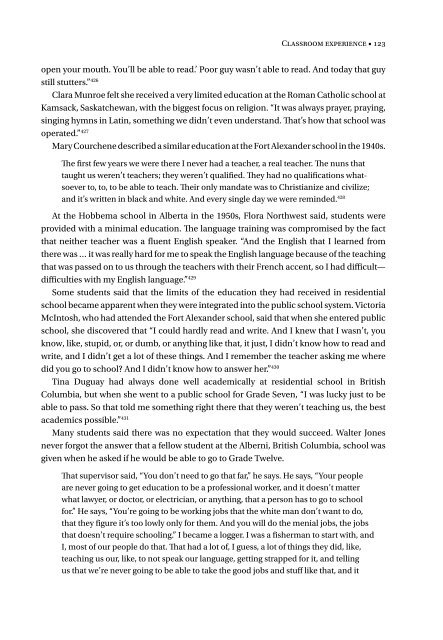The Survivors Speak
1MB8J05
1MB8J05
You also want an ePaper? Increase the reach of your titles
YUMPU automatically turns print PDFs into web optimized ePapers that Google loves.
Classroom experience • 123<br />
open your mouth. You’ll be able to read.’ Poor guy wasn’t able to read. And today that guy<br />
still stutters.” 426<br />
Clara Munroe felt she received a very limited education at the Roman Catholic school at<br />
Kamsack, Saskatchewan, with the biggest focus on religion. “It was always prayer, praying,<br />
singing hymns in Latin, something we didn’t even understand. That’s how that school was<br />
operated.” 427<br />
Mary Courchene described a similar education at the Fort Alexander school in the 1940s.<br />
<strong>The</strong> first few years we were there I never had a teacher, a real teacher. <strong>The</strong> nuns that<br />
taught us weren’t teachers; they weren’t qualified. <strong>The</strong>y had no qualifications whatsoever<br />
to, to, to be able to teach. <strong>The</strong>ir only mandate was to Christianize and civilize;<br />
and it’s written in black and white. And every single day we were reminded. 428<br />
At the Hobbema school in Alberta in the 1950s, Flora Northwest said, students were<br />
provided with a minimal education. <strong>The</strong> language training was compromised by the fact<br />
that neither teacher was a fluent English speaker. “And the English that I learned from<br />
there was … it was really hard for me to speak the English language because of the teaching<br />
that was passed on to us through the teachers with their French accent, so I had difficult—<br />
difficulties with my English language.” 429<br />
Some students said that the limits of the education they had received in residential<br />
school became apparent when they were integrated into the public school system. Victoria<br />
McIntosh, who had attended the Fort Alexander school, said that when she entered public<br />
school, she discovered that “I could hardly read and write. And I knew that I wasn’t, you<br />
know, like, stupid, or, or dumb, or anything like that, it just, I didn’t know how to read and<br />
write, and I didn’t get a lot of these things. And I remember the teacher asking me where<br />
did you go to school? And I didn’t know how to answer her.” 430<br />
Tina Duguay had always done well academically at residential school in British<br />
Columbia, but when she went to a public school for Grade Seven, “I was lucky just to be<br />
able to pass. So that told me something right there that they weren’t teaching us, the best<br />
academics possible.” 431<br />
Many students said there was no expectation that they would succeed. Walter Jones<br />
never forgot the answer that a fellow student at the Alberni, British Columbia, school was<br />
given when he asked if he would be able to go to Grade Twelve.<br />
That supervisor said, “You don’t need to go that far,” he says. He says, “Your people<br />
are never going to get education to be a professional worker, and it doesn’t matter<br />
what lawyer, or doctor, or electrician, or anything, that a person has to go to school<br />
for.” He says, “You’re going to be working jobs that the white man don’t want to do,<br />
that they figure it’s too lowly only for them. And you will do the menial jobs, the jobs<br />
that doesn’t require schooling.” I became a logger. I was a fisherman to start with, and<br />
I, most of our people do that. That had a lot of, I guess, a lot of things they did, like,<br />
teaching us our, like, to not speak our language, getting strapped for it, and telling<br />
us that we’re never going to be able to take the good jobs and stuff like that, and it


